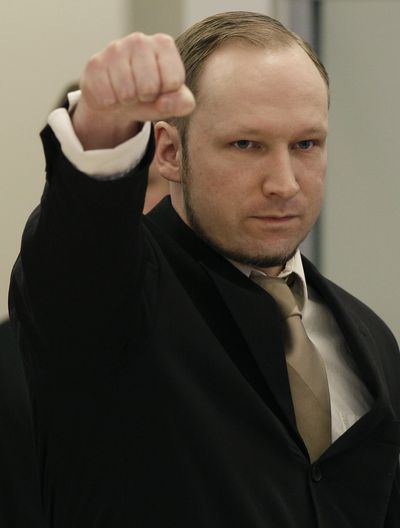Killer explains views in court
Norwegian lashes out against government

OSLO, Norway – In a scene unimaginable in many countries, Norway’s worst mass killer got the chance to explain his fanatical views to the court and the world, unrepentant and dressed in a business suit. Prosecutors and lawyers for the families of his 77 victims even shook his hand.
Two days into Anders Behring Breivik’s terror trial, the way Norway’s legal system deals with a confessed killer who rejects its authority is baffling – even to some Norwegians.
The 33-year-old far-right militant gave a rambling hourlong address to the court on Tuesday, reading from a statement that essentially summarized the 1,500-page anti-Islamic manifesto he posted online before his bomb-and-shooting rampage nine months ago.
“The attacks on July 22 were a preventive strike. I acted in self-defense on behalf of my people, my city, my country,” Breivik declared, demanding to be found innocent of terror and murder charges. “I would have done it again.”
Breivik has five days to explain why he detonated a bomb outside government headquarters in Oslo, killing eight people, then drove to a nearby resort island, where he massacred 69 others, mostly teens, at a summer youth camp run by the governing Labor Party.
Breivik, who has admitted carrying out the grisly acts, boasted they were the most “spectacular” by a nationalist militant since World War II.
His victims were part of a conspiracy to “deconstruct” Norway’s cultural identity, he said. Comparing the Labor Party youth wing to the Hitler Youth, he called their annual summer gathering an “indoctrination” camp.
Breivik also lashed out at Norwegian and European governments for embracing immigration and multiculturalism, and claimed to be speaking as a commander of an anti-Islam militant group he called the Knights Templar – a group that prosecutors say does not exist.
Norwegian legal experts said it was important that the country’s legal traditions apply to everyone, even Breivik, whose massacre shocked this prosperous, peaceful nation.
The justice system isn’t about “revenge, but sober, dignified treatment” for everyone accused of a crime, said Thomas Mathiesen, a professor of sociology of law at the University of Oslo.
“It is deeply ingrained in Norwegian tradition and fundamental values. If it lasts all the way through the 10 weeks of this trial, and I think it will, we have an important message to the world,” he said.
When Breivik entered the courtroom on Tuesday, he delivered the same clenched-fist salute with his right arm outstretched as a day earlier, turning to stare at the families of some of his victims.
On Monday, Norwegian prosecutors and even lawyers representing the families of victims shook Breivik’s hand as the trial opened, raising some eyebrows. Prosecutors shaking hands with defendants would be a rare sight in the U.S., as well as in neighboring Sweden and other Nordic nations.
“That was a bit strange,” said John Christian Elden, who represents some survivors but is not participating in the trial.
Breivik’s lawyers concede that his contention that he acted in self-defense is unlikely to succeed and said the main point was to avoid an insanity ruling, which Breivik contends would negate his cause.